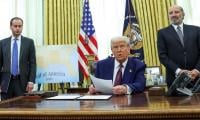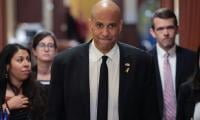VIENNA: The head of the UN’s atomic watchdog on Monday urged Iran to "cooperate immediately and fully" with a landmark nuclear agreement with world powers that is hanging by a thread.
The agency called on Iran to provide access to two locations, and said Tehran had failed to engage "in substantive discussions" to clarify the agency’s questions, said Rafael Grossi, the new chief of the International Atomic Energy Agency (IAEA).
Grossi said the IAEA had raised questions "related to possible undeclared nuclear material and nuclear-related activities at three locations that have not been declared by Iran". He added that the lack of access to two of the three sites and Iran’s failure to engage in talks was "adversely affecting the agency’s ability... to provide credible assurance of the absence of undeclared nuclear material and activities in Iran".
An IAEA report last week revealed that Tehran refused the agency access in January to the two sites. Diplomats say these are related to Iran’s alleged military nuclear projects in the 2000s, and not its current activities. But the renewed focus on Iran’s historic programme could add to current tensions.
Iran’s UN ambassador in Vienna, Kazem Gharib Abadi, said last week that Tehran had no obligation to grant IAEA access to sites if it deems the requests to be based on "fabricated information", accusing the US and Israel of trying to "exert pressure on the agency".
Israel has claimed that its intelligence services have new information on the alleged previous nuclear weapons programme in Iran. A second IAEA report last week outlined Iran’s continued breaches of the terms of the 2015 nuclear accord, but did not report any restrictions in access to nuclear facilities.
Speaking at a quarterly meeting of IAEA’s 35-member Board of Governors, Grossi said "to date, the agency has not observed any changes to Iran’s implementation of its nuclear-related commitments" since January when Tehran announced it would cease all obligations.
The 2015 accord -- offering Tehran sanctions relief in exchange for restrictions on its nuclear activities -- has been faltering since the US withdrew from it in 2018 and re-imposed harsh sanctions on Iran.
This has prompted Tehran to progressively abandon the accord’s restrictions since last year. Other parties to the deal -- China, Britain, Germany, France and Russia -- have been meeting with Tehran to try to save the accord.
Monsoon clouds loom over the overflowing river Yamuna, in New Delhi, India, July 15, 2023. — Reuters PARIS: Can...
Members of the Texas National Guard stand guard near the border wall between Mexico and the United States, as seen...
Iwao Hakamada, 88, leaves home for his daily stroll in Hamamatsu, central Japan September 26, 2024, 2024, in this...
Spokesperson for Matsamo CPA Bernard Shabangu poses for a photograph near their offices in the Kaalrug area south-east...
A Saudi tailor showing an Arabian robe made by him. — AFP/File Hofuf : Saudi tailor Habib Mohammed´s shop once...







